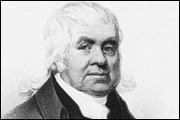John Murray's conversion to Universalism
How an 18th-century Calvinist embraced Universalism and became the first minister of a Universalist church in America.
In the mid-eighteenth century an evangelical revival was sweeping across Britain in reaction to the Age of Enlightenment. One of the movement’s leaders, George Whitefield, believed that Christ died only to save the “elect.” Relly, a Calvinistic Methodist minister, reasoned that if all had sinned in Adam, and Christ had died for all, it followed that all are already saved. That was an affront to his Calvinist colleagues. Relly was dismissed from Whitefield’s London Tabernacle. He started his own flock, known as Rellyites—the beginnings of modern Universalism.
Meanwhile John Murray, a passionate Calvinist preacher in Ireland, came to the London Tabernacle. Murray wrote in his autobiography that he learned that a young woman “of irreproachable life, remarkable for piety, and highly respected by the Tabernacle” had joined Relly’s congregation. Believing that she had been “ensnared” by a deceiver and blasphemer, and certain he could convince her of her error, he led a small group to pay her a call.
After exchanging pleasantries, she expounded on Relly’s reasoning, leading Murray on a lengthy, breathtaking syllogism about salvation and belief. Its essence: If Jesus is not the savior of unbelievers, then isn’t asking them to believe in him a lie? And if you were once a nonbeliever, did he never die for you until you believed?
Confounded and embarrassed into silence, Murray took his leave. “From this period,” he wrote, “I myself carefully avoided every Universalist.” Yet Murray increasingly found his fellow ministers’ arguments against Rellyism hollow and was drawn to learn more. He read Relly’s Union more than once, went to hear him preach, and before long was attending regularly and became a disciple.
Soon after Murray’s conversion, his young wife and their one-year-old son became ill and died, as did three sisters and a brother. He fell into debt and fell out with family and religious colleagues who opposed his new views. He was depressed, considered suicide, and eventually decided to go to America and leave behind his old life, including religion.
Bound for New York, his ship ran aground off the New Jersey coast. To lighten the load, the captain put some cargo onto a local sloop that passed by and asked Murray to oversee it. The ship was able to get off on the next morning’s tide. Just as it did, the wind shifted, and the sloop with Murray aboard was unable to follow.
Murray had taken only his Bible and his purse with him. He went ashore to find food and was directed to the home of Thomas Potter. Potter had built a meetinghouse for Universalist discussion groups in the woods ten years earlier and had been looking for a minister ever since. “I have been expecting you a long time!” Potter greeted Murray.
Murray was dumbstruck and initially refused Potter’s invitation to preach, insisting he would be gone by Sunday. At last he agreed he would if the wind had not changed. So on September 30, 1770, near what is now the Murray Grove Universalist Retreat Center in Lanoka Harbor, John Murray did preach. As soon as he finished, the wind changed, and Murray left for New York.
Eventually Murray settled in Gloucester, Massachusetts, serving as the minister of the first Universalist church in America. In 1786 the church won freedom from taxation in a ruling by the Massachusetts Supreme Judicial Court, laying a precedent for the separation of church and state. Murray also served as a chaplain in the Revolutionary War and as minister of the Universalist Society of Boston. He is still often referred to as the father of American Universalism, helping to found Universalism as a denomination in the 1790s.
See sidebar for links to related resources.








